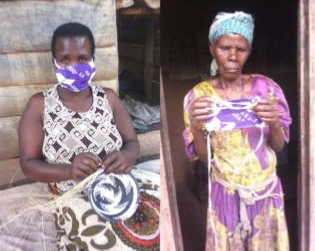ZAMBIA: City of Hope supports at-risk girls and mothers through the coronavirus pandemic

(MissionNewswire) The Salesian-run City of Hope, located in Lusaka, Zambia, is responding to the COVID-19 pandemic under the guidelines set forth by the Zambian government. Girls in the program have already made face masks that they are wearing and distributing to others while also working on completing their school packages, studying, reading, and making crafts.
The Salesian sisters who operate City of Hope have also focused on working with teachers, mothers and other educators to teach children about issues of sexual and gender-based violence, which has increased during the lockdown within the communities. They have sent informational letters to youth to educate them on these subjects since they cannot teach in classrooms.
“We are trying to be close to them through these other means even despite the challenges around country-wide lockdown measures. So far, we are doing well and our message is reaching them,” said Sister Prisca Mulenga Mwila, a Salesian sister at the City of Hope.
Salesian sisters are also preparing various support projects for once the lockdown restrictions ease, including continuing with longer-term fundraising efforts to support all of the self-sustaining programs in the community. In addition, the Salesian sisters are harvesting four to five trays of eggs a day from the chickens they have on the farm.
The City of Hope was established to meet the needs of youth and their families living in the most severe poverty in Lusaka. The vast majority of children attending City of Hope programs are those who have been abused, live on the streets or are victims of child trafficking.
The City of Hope’s Open Community School serves those suffering from malnutrition, lack of education and family deprivation. Basic education is offered to youth between the ages of 9 and 17. Primary school classes make up the first four years after which students take the government’s grade seven examinations. Most City of Hope students do not have the opportunity to attend other schools because of a lack of financial means.
The City of Hope also offers a shelter that is home to at-risk girls referred through the social welfare system, the police, and other institutions and organizations. Many have been orphaned and have nowhere else to go. There are currently 36 girls who live at the shelter between the ages of 7 to 22. The shelter is not an orphanage but rather a safe place for girls to stay while they gain an education and make the transition either to living with other family or to a more independent life. To date, more than 150 girls have received services through the City of Hope’s shelter.
Poverty is widespread in Zambia with 64 percent of the total population living below the poverty line. For those living in rural areas, the poverty rate rises to 80 percent, according to UNICEF. Over the past three decades, incomes in Zambia have fallen steadily and people do not have enough money to meet basic needs such as shelter, nutritious food and medical care.
The HIV/AIDS epidemic has also taken a devastating toll on Zambia’s children. There are 1.2 million children classified as orphaned and vulnerable by UNICEF, and these children struggle to find education, basic services and hope for their future.
###
Sources:
Photo courtesy of Salesian Missions (contact for usage permissions)
Salesian Missions – Zambia
UNICEF – Zambia





